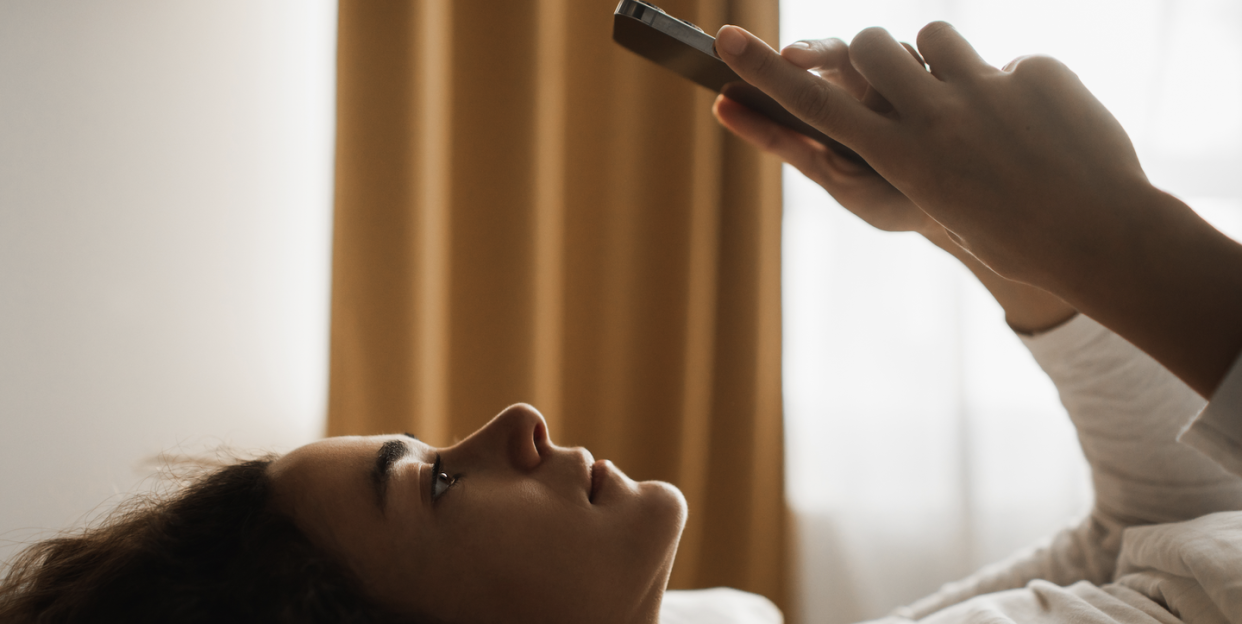Here's everything you need to know about cyberflashing now it's a criminal offence

From our weekly food shop to the way we meet potential partners, society is moving towards an increasingly online world. So, you'd be forgiven for thinking that when something bad happens online, it'll be treated with the same seriousness as it would in the offline world.
But while this is true for some web crimes, including revenge porn (which became illegal in 2015), unfortunately, not everything on the internet is as regulated as it should be – especially when it comes to sexually explicit content, such as deepfakes. It's something that campaigners and victims, including celebrities, have been fighting to change for years.
And now, at long last, new laws have come into play which finally makes cyberflashing a criminal offence.
The Online Safety Bill has officially been given Royal Assent, which means the legislation within the bill has become enshrined by law.
As well as covering a rage of digital offences, such as sending death threats, deepfaking intimate images and sharing sexual footage without consent of all parties involved, the Online Safety Bill offers tougher punishment against those who cyberflash - ie, share unsolicited explicit/intimate photos, typically of their own body parts.
"Online abusers and trolls will be prosecuted and put behind bars for their cowardly and menacing acts – ensuring the public are protected and can have better peace of mind when online," Michelle Donelan, Technology Secretary, said in a statement.
"Our pioneering Online Safety Act is already setting a global standard, and pivotal protections like these will keep sick individuals off our streets and unable to endanger Brits online."
Those who are convicted of cyberflashing will also result in perpetrators facing up to two years behind bars where it is done to "gain sexual gratification, or to cause alarm, distress or humiliation."
Many have campaigned tirelessly to make cyberflashing illegal. The topic found itseld at the forefront of conversations following the release of Emily Atack's Asking For It? documentary.
In the BBC special, The Inbetweeners star opened up about about the online abuse she's faced throughout her time in the public eye.
Here, Cosmopolitan UK explains exactly what cyberflashing is, and everything you need to know about the new law.
What is cyberflashing?
Cyberflashing is when an unsolicited photo of a person's genitals is sent without consent, either through social media apps like Instagram, dating apps like Hinge or iPhone's AirDrop feature. Typically, cyberflashing is a crime wherein the perpetrator is male and the victim is female.
In 2019, the British Transport Police revealed that there were 66 reported cases – emphasis on the 'reported' – but sadly, it's likely there were countless more that went unreported. Anecdotally, there have been many more stories shared of cyberflashing by AirDrop taking place on trains, buses and tubes (and this is before the pandemic hit, forcing the nation to stay at home and spend more time online than ever before).
Shockingly, nearly half of women aged 18 to 24 have received a sexual photo they did not ask for, according to a study carried out by dating app, Bumble, in 2022.
Although cyberflashing takes place entirely online, it has a massive impact on the receiver's experiences in the offline world too. "Cyberflashing is a form of sexual intimidation that can have devastating impacts on women," points out Clare McGlynn, Professor of Law at Durham University. "Women can be very fearful for their physical safety, wondering who sent them this photo and what will they do next? Women also feel violated and humiliated which can lead to considerable distress and anxiety."
On top of that, McGlynn points out, "Cyberflashing impacts women's everyday lives, like the decisions we make about using certain apps, AirDrop, social media and engaging online. It limits our freedom to live our lives as we choose."

23-year-old Jade from Manchester, who's been a victim of cyberflashing multiple times, says the experiences have made her feel "violated."
"I make a conscious effort to engage with likeminded people on my social platforms, as I know how difficult a place it can become," she explained, "To have someone come into my online space and violate that trust was difficult to get over."
What is the law on cyberflashing?
Despite the long-term impact that cyberflashing can have, and YouGov's study finding that 41% of millennial women say they've been a victim of it, cyberflashing has only been made illegal recently as part of the Online Safety Bill. While the Bill was passed by the UK government last year, it wasn't January 2024 that it was given Royal Assent, meaning the legislation has officially became part of UK law.
The move to make cyberflashing a criminal offence came about as part of the government's ongoing push to make people safer online – particularly women and girls – through the Online Safety Bill.
"It is why we’re keeping sexual and violent offenders behind bars for longer, giving domestic abuse victims more time to report assaults and boosting funding for support services to £185m per year," Former Deputy Prime Minister Dominic Raab previously said of the changes to the law. "Making cyberflashing a specific crime is the latest step – sending a clear message to perpetrators that they will face jail time."
News that cyberflashing was to be made a criminal offence came after 95% of women (under the age 44) expressed their concern about its impacts, with Bumble finding that the vast majority said they'd like to see more done to stop unsolicited nude images.
"Women's experiences of online abuse have not been taken seriously and too often the abuse we face, such as cyberflashing or upskirting, is trivialised and thought to be funny," McGlynn explained.
"Flashing your penis in the street is a criminal offence, but sending someone pictures of your penis online is not," McGlynn told us in 2021, before the law change had been announced. "Both should be criminalised, regardless of the perpetrator's motivation – humour, banter, sexual arousal, causing distress."
What is being done to tackle cyberflashing?
As well as making cyberflashing a criminal offence, the government's new bill puts more legal responsibility onto social media platforms, search engines and other websites. They're now required to tackle illegal and harmful content that's found on their services.
It's something that dating app Bumble has already been prioritising, with the app introducing their 'Private Detector' feature, which captures and blurs nude images. "This is the sort of action we need other social media companies and dating apps to take urgently," Whitney Wolfe Herd, Founder and CEO of Bumble told Cosmopolitan UK. "More companies should be following Bumble's example of being proactive against cyberflashing."
She went on: "Now more than ever, we spend a considerable amount of our lives online and yet we have fallen short of protecting women in online spaces. Cyberflashing is a relentless, everyday form of harassment that causes victims, predominantly women, to feel distressed, violated and vulnerable on the internet as a whole."
However, while much of the Online Safety Act’s protections are intended to hold tech companies and social media platforms to account for the content hosted on their sites, these new offences will apply directly to the individuals sending threatening or menacing messages and bring justice directly to them
As for what women can do to protect themselves from cyberflashing, McGlynn stresses the importance of reporting incidents. "I encourage women to report being cyberflashed if they feel safe to do so," she added. "This might mean reporting to police, to their school or university or to their employer. This can help to build a picture of what is going on, and to get authorities to take it seriously. It might also lead to action against the perpetrator."
For support or more information about sexual assault, visit the Survivors Trust. For additional support with mental health, visit Mind.
You Might Also Like

 Yahoo News
Yahoo News 
